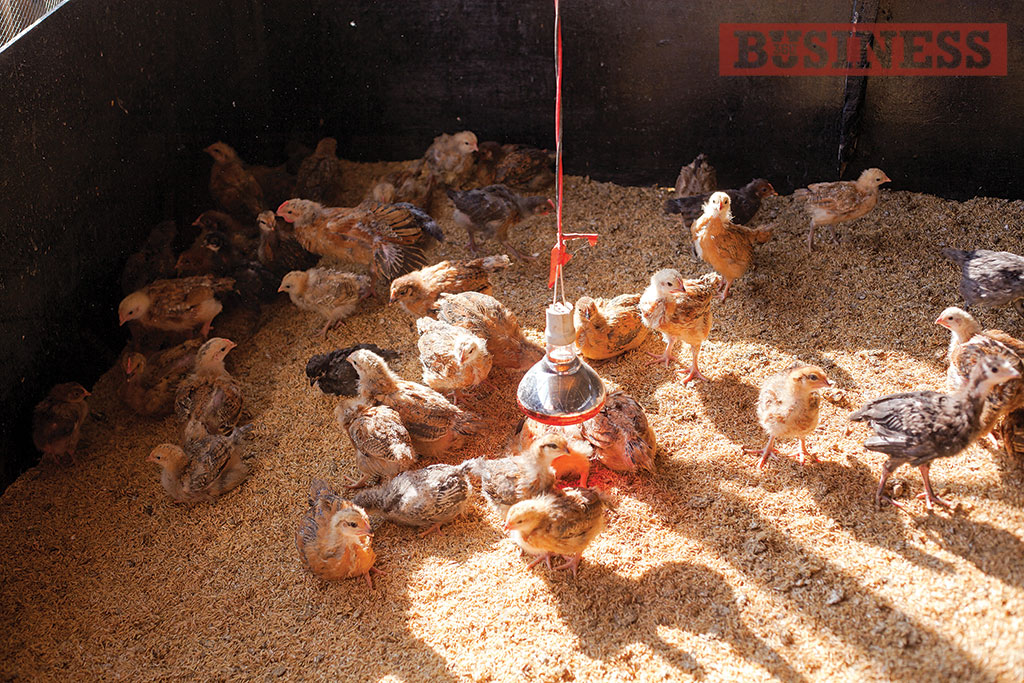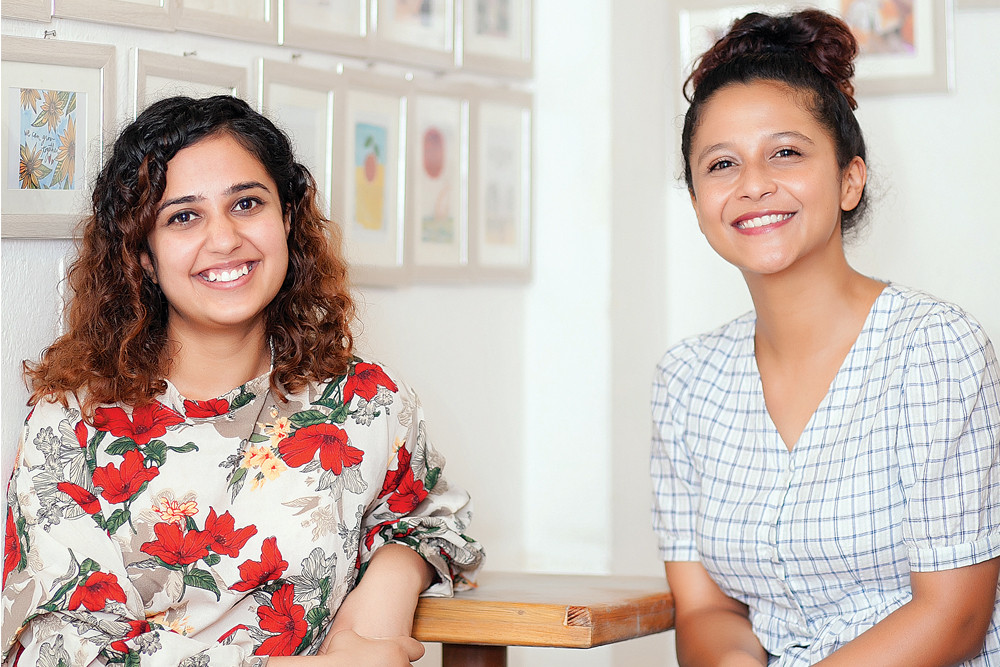
Text by Ankita Jain
A local NGO, X-pose, has taken it upon themselves to address and help solve the difficulties in Menstrual Hygiene Management (MHM) in a sustainable manner. Gyan Maharjan, the initiator and one of the founders of the organisation, is also engaging adolescent girls and women in raising awareness on menstrual health. To the nation, Maharjan is a social entrepreneur and Pad Man. He designed and began manufacturing cloth pads which are reusable and can last up to two years. His product is a blend of traditional practices with modern design. And this creation of his is changing the lives of hundreds of women across the nation.
Though he has been featured in many newspapers and television channels, the man is matter-of-fact about his celebrity status. “My work remains the same,” he says, seated in his little rented office in the busy lanes of Patan. “Tomorrow, I will walk into a remote village with my cloth pads and no one will recognise me,” he says. “Nothing has changed or will change.” But the cause that he upholds —to take cloth pads to every nook and corner of the country —is gradually gaining momentum. In another 30 years, he aims to cover the entire country.
Growing up in Khokana, Maharjan had seen first-hand how his own community treated his mother, sisters and relatives during their menstrual period. Much of his community was illiterate and did not understand proper menstrual health and sanitation. Even though he had seen this from a young age, actual awareness came when he got a chance to assist a film crew who were filming a documentary regarding women rights in 2004.
“While filming the documentary, I got a chance to closely observe how women are forced to stay in one corner of a dark room during their menstrual period,” says Maharjan. “It was heart-wrenching to see them being treated as untouchables for four days. And they were using dirty pieces of cloth during their periods.”
It’s like breaking a massive mountain with a sledgehammer singlehandedly—the stigma surrounding the subject is as such. He recalls how his obsession with research on sanitary napkins earned him nothing but ridicule from those around him. “My neighbours thought I was suffering from a mental illness,” he laughs. “I was close to being a pervert for them.” He wanted to create low-cost environmental friendly cloth pads.
Maharjan did extensive research on the existing sanitary napkins in the market and the findings were shocking. “Commercial disposable sanitary napkins pose health hazards due to its chemical cocktail content (dioxin, furan, pesticides and other endocrine disruptors). These non-compostable sanitary pads are making their way into sewerage systems, landfills, fields and water bodies every month. The problem does not end here. The plastic layer which is used to make it stain-free and the chemicals used in producing it get further transferred between soil, water and air. Apart from the fact that it cannot be recycled, the exposed sanitary napkin poses grave health risks for the waste collector,” he states. Also, many women flush down disposable sanitary napkins after use, clogging underground drains and manual scavengers bear the health cost for the same.
He further elaborates on the ignorance of raw materials used in making most sanitary products. “They are falsely assumed to be only cotton and plastic. The products are more than 90 % plastic with superabsorbent polymers and non-woven plastic components that make it extremely difficult to dispose off in a backyard shortcut way,” he explains.
His work took bizarre turns —he researched alternative ways, designed the product and had a tough time when he wanted to get it stitched. He was that mad inventor, people just didn’t understand. He used to ask women for feedback and they would turn away. Lately, when his product was introduced by newspapers and he was called the Pad Man, his life changed forever.
Early in 2007, Maharjan connected with seven friends to form X-pose, an organisation that sought to ‘expose’ the violence women faced in society. It was eight years later, in late 2015 that he formally began to campaign for menstrual health and by 2016, he started making cloth pads. He is often compared to Arunachalam Muruganantham, an Indian social entrepreneur, who received plaudits for developing low-cost sanitary pads, on whom the film ‘Pad Man’ was based on. The only difference is that Muruganantham developed machines to manufacture low-cost sanitary napkins while Maharjan kept it simple to hand stitching.
Maharjan’s pads come in different colours and in three sizes - standard, medium and large. The former two cost Rs 150 and the latter Rs 160, all hand-stitched with cotton and flannel fabrics. These pads can be washed and reused for up to two years.
Readymade pads, on the other hand, cost a minimum of Rs 100 for a pack of seven. This means women spend a minimum of Rs 1200 in one year on sanitary napkins alone. “Approximately 10 pads/tampons per month, equating to 120 per year which over the average lifespan of a menstruating female (approximately 40 years of periods) gives us the total of 4800 feminine hygiene products used during one woman’s lifetime. Now multiply that by the 3.5 billion women on the planet and we have a considerable amount of potentially avoidable waste,” he briefs. “If you buy four handmade reusable cloth pads, they can be used for two years for just Rs 640 and you also contribute towards the environment,” says Maharjan.
Currently, he has 27 women working with him, who besides taking care of their household chores can stitch 5-6 cloth pads a day. Also, most of the money made from selling the pads goes back to the women who made them. His employees make Rs 115 for each pad they make. “The material for one standard size sanitary pad cost Rs 90; Rs 25 for stitching and the rest Rs 35 is the profit margin. We keep the minimum amount for ourselves to survive and run the organisation,” he states. He recently shifted his office from Pulchowk to the lanes of Patan as part of cost-cutting.
In his early forties, Maharjan doesn’t just sell pads, he spreads awareness. Initially, he worked in the community, but now he’s started talking in schools. “We give training in government and private schools. We aware them about menstrual health and teach them how to make a reusable cloth pad. While we give free training in government schools, we charge a minimum cost for private schools,” he claims. So far, Maharjan’s organisation has trained over 1000 plus women to make cloth pads, which he sells through a store in Khokana and Pulchowk. He sells over 1000 handmade cloth pads a month, says Maharjan.
He personally travels to train women to make sanitary napkins in regions affected by extremism. He says there are villages where women can’t even afford an undergarment and borrow it when their period hits. “We have designed period panties for them, which are underwear fitted with absorption material. We will soon manufacture them and distribute in the villages at the minimum cost possible or even for free,” he informs. Many girls in villages of other provinces don’t attend school due to lack of awareness and high cost of sanitary pads. Maharjan is changing that. This is the best thing about his product—that a village girl who shut herself at home simply because she cannot afford the sanitary napkins every month, can reuse his cloth pads time and again for the next two years.
In all these years of working on menstrual hygiene, what he finds most difficult to deal with, is the superstition surrounding it. “Women in rural Nepal have the strangest beliefs surrounding the monthly period,” he says. He is trying to break these by educating them. He doesn’t believe that it is women alone who should campaign for menstrual health and hygiene and try to get rid of archaic notions of purity and cleanliness. Men, too, need to step up to discard age-old taboos that don’t make sense in the modern world. “Every day we talk about Chhaupadi in the far west, but the situation is not too different here in the capital city,” he says. “We don’t need to go far. The fear of menstruation is ubiquitous in almost all upper-caste families in Kathmandu. Women are still considered untouchable during their menstruation period and deprived of basic hygiene and sanitation,” he adds.
Currently, Maharjan is trying his best to tap corporates for funds or any kind of help under their Corporate Social Responsibility banner. “We are more than happy if any organisation offers us even the fabrics needed. It will majorly bring down the cost and hence we can provide the cloth pads to rural women at a much cheaper price or even for free,” he smiles.
Benefits
• Women with sensitive skin might benefit from cloth pads because, unlike regular pads, they are made from cotton and not plastic and don’t irritate the skin.
• Cloth pads are free of irritating materials, so you can avoid unnecessary exposure to synthetic ingredients in disposable pads and tampons.
• While they do have a high one-time cost, they are inexpensive in the long run since they can be washed and reused.


.jpg)


.jpg)